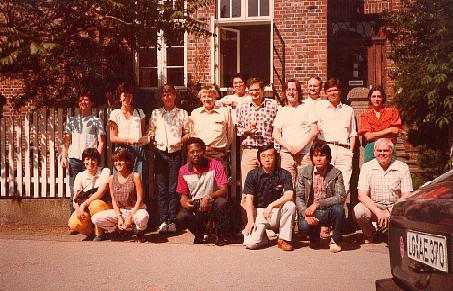It’s the oddest thing: looking at this snapshot, taken 30 years ago this month, I can remember the name of only one person in the picture besides me, but I remember almost everyone’s nationality. Then again, the grundstufe 1 class at the Goethe Institut in Lüneburg, West Germany, in the summer of ’83 was a motley one, representing four continents and at least 10 countries. That must have made an impression on a lad traveling outside of his country for the first time.
 I was traveling that summer with college friends Rich and Steve. It was their idea to study German in Germany, the better to read philosophy. My interest in 19th-century continental philosophers wasn’t as keen as theirs, but I thought spending five or so weeks in one place, taking classes in the morning and knocking around the rest of the time, would be a good idea. And so it was.
I was traveling that summer with college friends Rich and Steve. It was their idea to study German in Germany, the better to read philosophy. My interest in 19th-century continental philosophers wasn’t as keen as theirs, but I thought spending five or so weeks in one place, taking classes in the morning and knocking around the rest of the time, would be a good idea. And so it was.
How they picked Lüneburg, I don’t remember, but it’s a fine Lower Saxony town near Hamburg. I ought to ask them sometime. They might not remember either. Rich and Steve knew some German already, so were in a higher class. I was in the beginner class, grundstufe 1. One day, the class went outside an lined up for a photo.
On the upper row, beginning on the left, are three Americans. The fellow on the farthest left was nicknamed Howdy Doody (by the other Americans) for his red hair, small stature, and childishness. Fourth on the left was Herr Witt, our teacher. A fitting name, since he was a lively, entertaining teacher. Next, and to the back, a Japanese fellow. Then me. Next to me, a Finn, who was something of a celebrity on Finnish children’s TV, if I remember right. I ought to remember his name, since he lived in the same building as I did, and we spoke fairly often, but I don’t. Behind him, a Frenchman, and then a South American whose nation I forgot. At the end is an Italian woman.
On the lower row, beginning on the left, two Italian girls; Howdy Doody in particular was fond of flirting with the girl second to left, and she was fond of brushing him off. The black fellow was from Canada. Next to him, another Japanese guy. I ran into him one day at the Lüneburg McDonald’s, and we had lunch together. Next to him, a Venezuelan, and finally a Hungarian, our only classmate from behind the Iron Curtain.